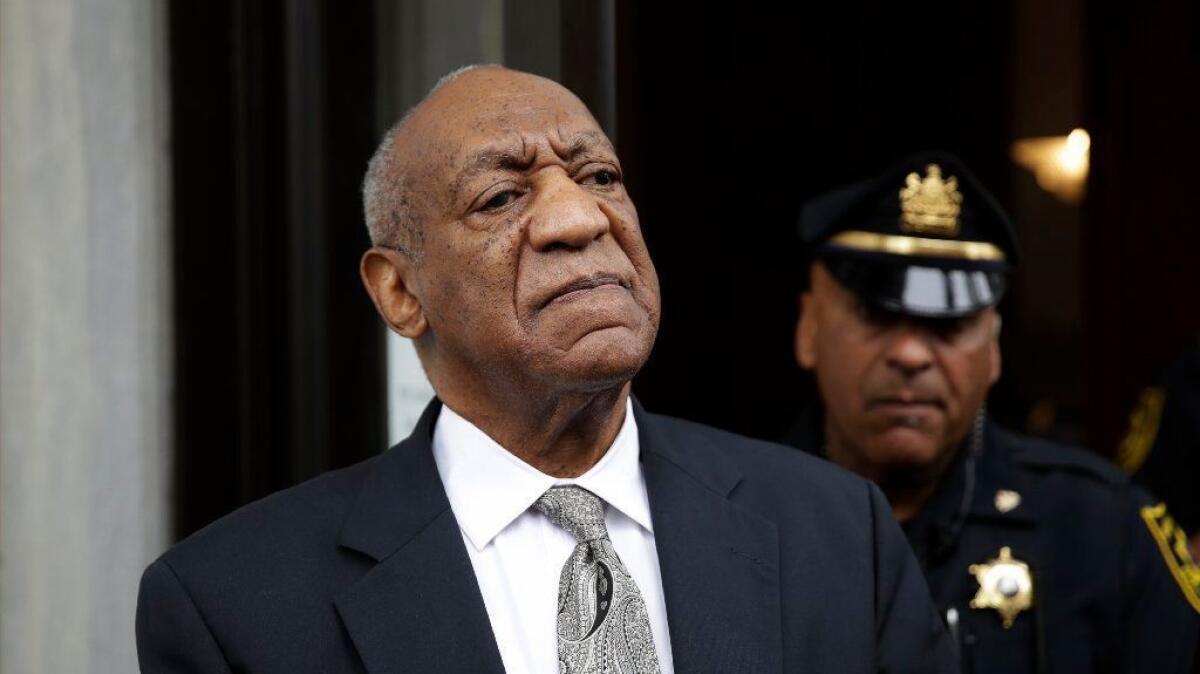As jurors from Bill Cosby trial step forward, his spokesman says Cosby will hold seminars on avoiding sex crime allegations

- Share via
Reporting from New York — Jurors from the Bill Cosby sexual assault trial have begun to step forward, with one explaining a rationale to acquit.
“My personal feeling is whatever the man did, he’s already paid his price. Paid and suffered,” the juror told the NBC affiliate WPXI in Pittsburgh. The juror was not identified by name or gender in a release the network sent out Thursday.
Cosby had been charged with three counts of aggravated indecent assault for a 2004 incident involving former Temple University staffer Andrea Constand. The jury told the judge Saturday morning that they were hopelessly deadlocked, leading him to declare a mistrial.
The names of the jurors were revealed Wednesday.
A report from ABC News about the case also cited an anonymous juror.
The person said 10 jurors voted to convict and two to acquit on two of the three counts. The remaining count, which specifically alleged that Constand was unconscious during the assault, had only one holdout for acquittal.
“There was no budging,” the juror said, describing a process in which the 12-person panel deliberated for 53 hours over six days before the mistrial was declared.
The juror who spoke to NBC said that there were as many as seven who voted to acquit before they shifted to a large majority advocating for a guilty verdict. “The tears came toward the end,” the juror said of the deliberations. “It was so tense.” The comments were set to air on NBC News on Thursday night.
Meanwhile, another juror, an alternate, has stepped forward: A man identified as a 24-year-old food delivery employee from Pittsburgh is scheduled to appear on “Inside Edition” on Thursday.
The man did not identify himself, but he appears on screen and, based on public records and a LinkedIn account, is Anthony Rabinovitz.
“One of the jurors did tell me at some point, ‘I didn’t know I was claustrophobic until this week,’” Rabinovitz said on the program.
Asked how he would have voted had he been on the regular jury, Rabinovitz said, “The evidence wasn’t strong enough. It was a classic he-said, she-said, and there was too many holes — too many holes in the prosecution’s case, I feel.”
The judge in the case, Steven T. O’Neill, ruled Wednesday that the juror names could be revealed, citing a limited 1st Amendment right for the media to publish them.
But — along with the prosecution and defense, who came together on a motion to suppress the names — he worried that any discussion about how they voted could prejudice a new jury.
In announcing the ruling he also issued strict guidelines for how jurors were allowed to speak to the media.
“Jurors shall not disclose anything said or done in the jury room by any of their fellow jurors that may disclose their thoughts or opinions,” he said of the jurors, who had been bused from the Pittsburgh area to the Norristown, Pa., courtroom several hundred miles away, where they were sequestered for two weeks. “Jurors shall not disclose arguments or comments made, or votes cast, by fellow jurors during deliberations.”
This followed courtroom instructions Saturday in which he reminded jurors they had no obligation to talk to the media and that any interviews they gave could have a chilling effect on future deliberations.
Calls by The Times to phone numbers believed to belong to the 18 panelists — 12 jurors and six alternates — did not result in any interviews with jurors. A family member of one of the jurors, Robert Dugan, answered the phone but said that Dugan had “left for the night” and did not wish to speak after the long ordeal.
Only one juror has chosen to be publicly identified: Michael McCloskey, an alternate who said he would “probably” have voted to convict.
A new trial is expected to start by October. The prosecution has said it will again mount a case that features Constand as the key witness.
The defense has maintained Cosby’s innocence and said it will continue to fight the charges. It is also likely, a lawyer for Cosby told The Times this week, to file various motions seeking to stop a retrial.
Separately on Thursday, Cosby representatives Andrew Wyatt and Ebonee Benson appeared on a local Alabama TV program Thursday to describe a sexual assault seminar they said Cosby would give about avoiding false prosecutions — about the “dangers engaging in behavior that could lead to sex crimes allegations.”
“This is bigger than Bill Cosby — the issue can affect young persons … and they need to know what they’re facing,” Wyatt said.
Benson added that “people need to be educated about a brush against the shoulder — anything can be considered sexual assault.”
Victims’ rights groups quickly condemned the statements and any plans for a seminar.
See the most-read stories in Entertainment this hour »
Twitter: @ZeitchikLAT
Times staff writers Alexandra Zavis and Kurtis Lee contributed to this report.
UPDATES:
3:15 p.m.: This article was updated with accounts of interviews with one juror and two alternate jurors.
This article was originally published at 10:55 a.m.
More to Read
Sign up for Essential California
The most important California stories and recommendations in your inbox every morning.
You may occasionally receive promotional content from the Los Angeles Times.











